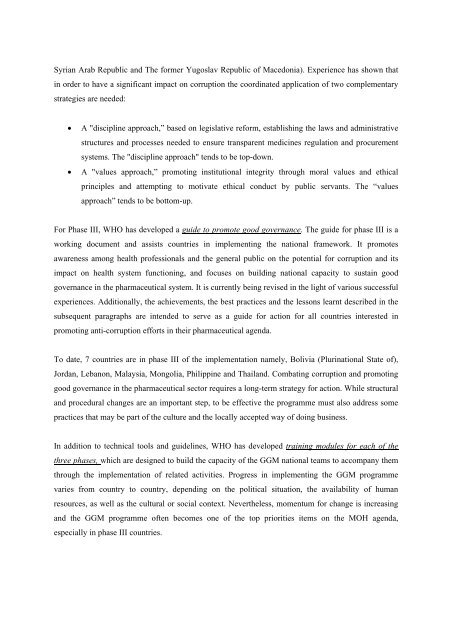WHO Good Governance for Medicines programme: an innovative ...
WHO Good Governance for Medicines programme: an innovative ...
WHO Good Governance for Medicines programme: an innovative ...
You also want an ePaper? Increase the reach of your titles
YUMPU automatically turns print PDFs into web optimized ePapers that Google loves.
Syri<strong>an</strong> Arab Republic <strong>an</strong>d The <strong>for</strong>mer Yugoslav Republic of Macedonia). Experience has shown that<br />
in order to have a signific<strong>an</strong>t impact on corruption the coordinated application of two complementary<br />
strategies are needed:<br />
• A "discipline approach,” based on legislative re<strong>for</strong>m, establishing the laws <strong>an</strong>d administrative<br />
structures <strong>an</strong>d processes needed to ensure tr<strong>an</strong>sparent medicines regulation <strong>an</strong>d procurement<br />
systems. The "discipline approach" tends to be top-down.<br />
• A "values approach,” promoting institutional integrity through moral values <strong>an</strong>d ethical<br />
principles <strong>an</strong>d attempting to motivate ethical conduct by public serv<strong>an</strong>ts. The “values<br />
approach” tends to be bottom-up.<br />
For Phase III, <strong>WHO</strong> has developed a guide to promote good govern<strong>an</strong>ce. The guide <strong>for</strong> phase III is a<br />
working document <strong>an</strong>d assists countries in implementing the national framework. It promotes<br />
awareness among health professionals <strong>an</strong>d the general public on the potential <strong>for</strong> corruption <strong>an</strong>d its<br />
impact on health system functioning, <strong>an</strong>d focuses on building national capacity to sustain good<br />
govern<strong>an</strong>ce in the pharmaceutical system. It is currently being revised in the light of various successful<br />
experiences. Additionally, the achievements, the best practices <strong>an</strong>d the lessons learnt described in the<br />
subsequent paragraphs are intended to serve as a guide <strong>for</strong> action <strong>for</strong> all countries interested in<br />
promoting <strong>an</strong>ti-corruption ef<strong>for</strong>ts in their pharmaceutical agenda.<br />
To date, 7 countries are in phase III of the implementation namely, Bolivia (Plurinational State of),<br />
Jord<strong>an</strong>, Leb<strong>an</strong>on, Malaysia, Mongolia, Philippine <strong>an</strong>d Thail<strong>an</strong>d. Combating corruption <strong>an</strong>d promoting<br />
good govern<strong>an</strong>ce in the pharmaceutical sector requires a long-term strategy <strong>for</strong> action. While structural<br />
<strong>an</strong>d procedural ch<strong>an</strong>ges are <strong>an</strong> import<strong>an</strong>t step, to be effective the <strong>programme</strong> must also address some<br />
practices that may be part of the culture <strong>an</strong>d the locally accepted way of doing business.<br />
In addition to technical tools <strong>an</strong>d guidelines, <strong>WHO</strong> has developed training modules <strong>for</strong> each of the<br />
three phases, which are designed to build the capacity of the GGM national teams to accomp<strong>an</strong>y them<br />
through the implementation of related activities. Progress in implementing the GGM <strong>programme</strong><br />
varies from country to country, depending on the political situation, the availability of hum<strong>an</strong><br />
resources, as well as the cultural or social context. Nevertheless, momentum <strong>for</strong> ch<strong>an</strong>ge is increasing<br />
<strong>an</strong>d the GGM <strong>programme</strong> often becomes one of the top priorities items on the MOH agenda,<br />
especially in phase III countries.<br />
9

















